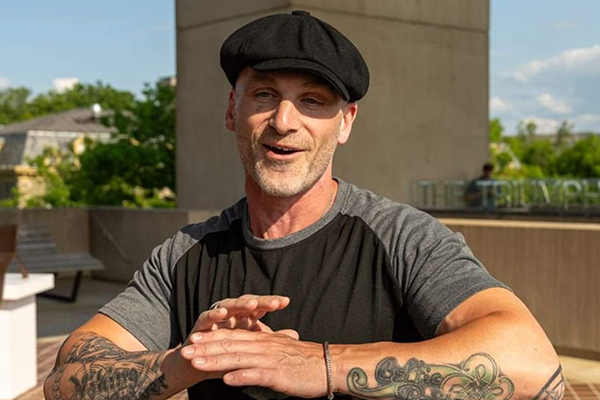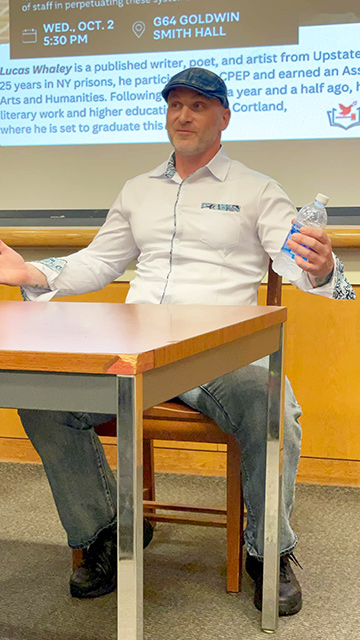
05/16/2025
SUNY Cortland senior English major Lucas Whaley, 44, will walk at the university’s Commencement ceremony on Saturday with honors, and with pride in an accomplishment he could not have imagined when he was the age when most of his fellow 2025 graduates were applying to college.
When Whaley was 17, he was convicted for his role in a brutal 1998 murder and began serving 25 years of maximum-security incarceration at Auburn Correctional Facility.
“I made choices, and in some cases I didn’t realize I was making choices,” Whaley said of his teenage self. “But sometimes the knowledge that people are working with, it’s messed up, it’s just plain wrong. I don’t think I ever came across anyone who didn’t think that they were doing the best that they could. I think the best thing is giving people more tools so they feel there are more options when they are making those choices.”
Whaley became aware of those options thanks to Cornell University’s prison education program, Cayuga Community College and, ultimately, SUNY Cortland.

Through those institutions, Whaley began to see the world differently and developed a natural talent for raw, real and soul-searching creative writing. As a SUNY Cortland student, Whaley made the dean’s list every semester. He was inducted into Sigma Tau Delta, the international English honor society.
Since being paroled two years ago, he has worked as a certified personal trainer and become a certified Building Systems and Environmental Specialist. Whaley is certified in CPR and is exploring graduate schools in his field.
And he published a riveting short story, “Towards a Theory of Eternity,” in the SUNY Cortland English Department’s online literary journal, Crystallize Review. The work was selected as a finalist in the university’s Distinguished Voices Short Story Contest by guest judge author Raul Palma. It is rare for incarcerated individuals like Whaley to turn their lives around this way. That’s one reason that Rob Scott, executive director of CPEP, and New York State District 125 Assemblymember Anna Kelles, will attend Whaley’s graduation as special guests. Whaley credits taking classes through the Cornell Prison Education Program (CPEP) for 13 years with enabling him to imagine a productive life beyond prison walls.
But it almost didn’t happen.
“I had a real problem of trying things I thought I would fail at,” Whaley said. “Every time that it happened, it was another piece of evidence in my mind that I just wouldn’t be able to do anything worthwhile. So, it was really stepping out of my comfort zone even taking the entrance exam.”
Luckily, a prison friend grabbed the CPEP application he’d filled out and dropped it in the mail before Whaley could back out.
Whaley completed the CPEP program with 247 credits, an associate of arts degree from Cayuga Community College and a Certificate in the Liberal Arts from Cornell University. He now collaborates with CPEP and has given talks at Cornell about his experience.
All of that was unthinkable on that fateful, March 17, 1998, day, when Whaley was one of three friends in Johnstown, N.Y., who decided to teach a fourth friend a lesson and things spun horribly, fatally, out of control. In 2017, the killing became an episode of the crime documentary series “Murder Among Friends” on the Investigation Discovery channel.
At the time of the murder, Whaley was homeless, cut off from what was then a badly broken family life. He had never attended school beyond the eighth grade and had earned his GED in a county lockup at age 16 while serving time for a weapons possession conviction.

“Prison is definitely going to change you,” he said of his evolution. “And getting older changes you. And being forced to deal with people from various backgrounds and from various places with various outlooks on life is going to change you. College changes you. It gave me better tools to communicate with and better ways to understand people that I’m dealing with and that helps me to not deal with anger.
“And honestly, the time I did in the box helped me reflect on a better understanding about where my anger was coming from, and that helped a lot, too. You know, when you realize that it’s not just a facet of who you are as a person but something that’s coming from somewhere. I’m a firm believer that you don’t have agency until and unless you realize you have agency. Until then, you’re just reacting to things around you and to you.”
At the maximum-security Auburn Correctional Facility, he served his time for many years before he began thinking about a path for reentering society as a law-abiding citizen. He was clueless when presented with a course catalog.
“I had no concept of what a major was or my options,” Whaley said. “But when looking at the course catalog and what to choose from, I knew that I wanted to write.
“I had lost somebody really close to me right before I got to Auburn,” Whaley said. “I was in the box (solitary confinement), when I got the news. I was really messed up about it and started writing. It didn’t have to do with anything I was thinking or feeling, but it was just fiction, and fantastical at that. It made me feel better. Because it wasn’t about any of those things, but it was about all of those things. I just knew that writing was what I wanted to explore.”
“Even in the beginning, I just barely squeaked in,” Whaley said of his performance on the CPEP entrance exam. “So I could only take one class at time my first semester. “
That was fall 2010, and it was a class in fiction writing.
Every semester, each professor can move one promising part-time student up to full time. By spring 2011, Whaley earned a professor’s recommendation.
“I took one class over the summer break and that fall, I really started to feel like I might be able to do this,” Whaley said. “I was having a lot of fun in the process, and I guess I didn’t expect that.
Whaley knows he’s lived a very limited and confined life. That’s expressed in his short fiction.
“All of it comes from life experience, not just my personal experience but what I’ve been around, seen, heard about. All of it comes from my lived experience. Just how much comes from my personal life is anybody’s guess. I had imagined quite a bit of it in some cases. But as they say, mileage will vary on that. It kind of depends on what the subtext of whatever I’m writing is.”
Many people are working on reentry programs now, but prisons could offer more opportunities, too, he noted.
“Prisons should be a place where people who mess up reform and go back and improve the neighborhood that they came from and then better those neighborhoods, so that we don’t have the same people from the same neighborhoods going back to prison generation after generation,” Whaley said. “These things should be shifting and changing if incarceration is doing the job that it is supposed to. But it’s not. And, honestly, more could be done to help kids before they even get on that path.”